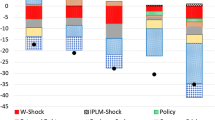Abstract
Standard real models predict that a permanent increase in oil prices would result in a current account surplus. The surplus occurs because investment falls while saving remains unchanged. This paper shows that if currency substitution is introduced into the analysis, a permanent increase in oil prices could cause a current account deficit. Furthermore, the greater the dependence of the economy on oil, the larger will be the deficit. The availability of foreign money makes it optimal for the public to decrease saving following the terms of trade deterioration. The fall in saving could more than offset the decline in investment.
Similar content being viewed by others
Rights and permissions
About this article
Cite this article
Végh, C. Effects of Currency Substitution on the Response of the Current Account to Supply Shocks. IMF Econ Rev 35, 574–591 (1988). https://doi.org/10.2307/3867111
Published:
Issue Date:
DOI: https://doi.org/10.2307/3867111




